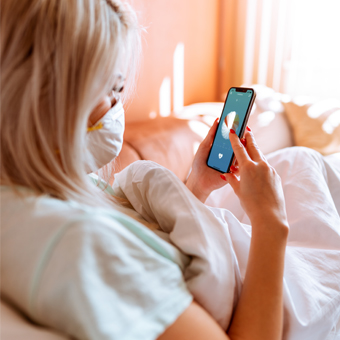
How a mobile ECG can help during the Corona crisis
The pandemic caused by the novel coronavirus COVID-19 is currently on the rise worldwide and the resulting crisis is also having a major impact on healthcare systems. Doctors1 and leading professional associations such as the American College of Cardiology (ACC)2 are now calling for the rapid implementation of telemedicine to break infection chains and relieve the burden on the healthcare system.
While hospitals and medical practices are reaching their limits with their resources, the only sensible measure in case of a suspected infection is currently to avoid personal contact with other people. Social distancing is also recommended to the general public and many countries have curfews, contact bans and other measures to minimize the spread of the infection. Official recommendations therefore now recommend contacting doctors or clinics by telephone. However, suspected cases of cardiovascular disease in particular could be dealt with far more efficiently. This is demonstrated by App-based medical devices based on mobile ECG technologies that are already available today.
"A mobile Tele-ECG (CardioSecur) can very easily help COVID-19 patients with heart conditions to quickly detect possible complications without having to leave home. The implementation of telemedical care should start immediately," demands Dr. Niels Jacobsohn, cardiologist from Berlin. In fact, heart patients are at a significantly increased risk if they fall ill with the novel coronavirus and, based on the case numbers to date, about 40% of COVID-19 inpatients suffer from chronic cardiovascular disease.
Therefore, the ACC also recommends the rapid identification and isolation of cardiovascular patients with COVID-19 symptoms from other patients. However, the symptoms of a COVID-19 infection can overlap with the classic symptoms and typical clinical pictures of acute myocardial infarction (AMI) and there is a risk of underdiagnosis. Here, too, a mobile ECG can support the diagnosis.
A further decisive advantage of telemedicine is the structural improvement for fully utilized clinics and medical practices. "Nationwide care for heart patients with a mobile tele-ECG is now necessary. It can massively relieve the clinics and, for example, prevent further infection by symptom-free clinic staff. Cardiologists now use CardioSecur," says Dr. Jacobsohn. Patients without COVID-19 symptoms who need an ECG diagnosis can simply send it from home to their family doctor, cardiologist or internist. Patients who have already tested positive for COVID-19 and are at increased cardiovascular risk can record an ECG at home in quarantine and receive a trigger to act. The personal physician gains insight into the ECG and in most cases can make a diagnosis without personal contact. In case of serious cardiac events, these patients can then receive fast and effective help. In the case of inconspicuous ECG findings, however, patients can stay at home with peace of mind and avoid unnecessary visits to doctor's offices and hospitals where the risk of infection is particularly high. This minimizes the likelihood of infection and the risk of being exposed to COVID-19.
Beyond personal risk, there is also a positive health economic effect, since patients only visit the clinic in an emergency and the already strained personnel and material resources such as doctors, nursing staff and beds remain available for the really serious cases of COVID-19.
1 Judd E. Hollander, M.D. and Brendan G. Carr, M.D. "Virtually Perfect? Telemedicine for Covid-19". The New England Journal of Medicine. March 11, 2020. https://www.nejm.org/doi/full/10.1056/NEJMp2003539
2 American Colege of Cardiology. "Telehealth: Rapid Implementation For Your Cardiology Clinic (Updated March 24, 2020)". March 13, 2020. https://www.acc.org/latest-in-cardiology/articles/2020/03/01/08/42/feature-telehealth-rapid-implementation-for-your-cardiology-clinic-coronavirus-disease-2019-covid-19



